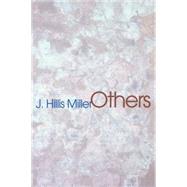Others
, by Miller, J. Hillis- ISBN: 9780691012230 | 0691012237
- Cover: Paperback
- Copyright: 10/1/2001
This volume fulfills the author's career-long reflections on radical otherness in literature. J. Hillis Miller investigates otherness through ten nineteenth- and twentieth-century authors: Friedrich Schlegel, Charles Dickens, George Eliot, Anthony Trollope, Joseph Conrad, W. B. Yeats, E. M. Forster, Marcel Proust, Paul de Man, and Jacques Derrida. From the exquisite close readings for which he is celebrated, Miller reaps a capacious understanding of otherness--one reachable not through theory but through literature itself. Otherness has wide valence in contemporary literary and cultural studies and is often understood as a misconception by hegemonic groups of subaltern ones. In a pleasing counter to this,Othersconceives of otherness as something that inhabits sameness. Instances of the ''wholly other'' within the familiar include your sense of self or your beloved, your sense of your culture as such, or your experience of literary, theoretical, and philosophical works that belong to your own culture--works that are themselves haunted by otherness. ThoughOthersbegins and ends with chapters on theorists, the testimony they offer about otherness is not taken as more compelling than that of such literary works asDicken's Our Mutual Friend, Conrad's ''The Secret Sharer,'' Yeats's ''Cold Heaven,'' or Proust'sRemembrance of Things Past. Otherness, as this book finds it in the writers read, is not an abstract concept. It is an elusive feature of specific verbal constructs, different in each case. It can be glimpsed only through close readings that respect this diversity, as the plural in the title--Others--indicates. We perceive otherness in the way that the unseen--and the characters' emotional responses to it--ripples the conservative ideological surface ofHoward's End. We sense it as chaos in Schlegel's radical concept of irony. And we gaze at it in the multiple personifications ofHeart of Darkness. Each testifies in its own way to the richness and tangible weight of an otherness close at hand.






